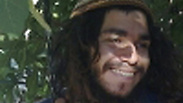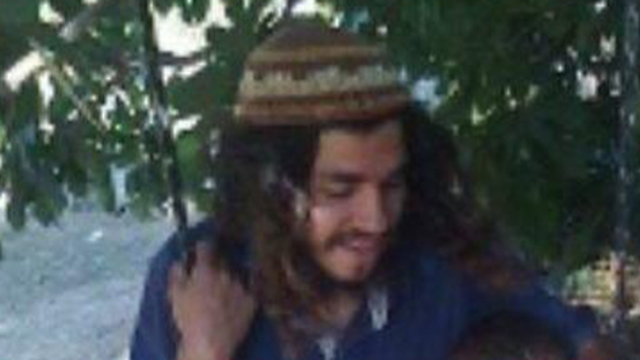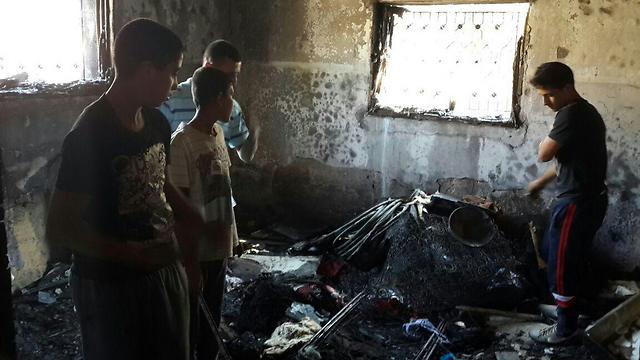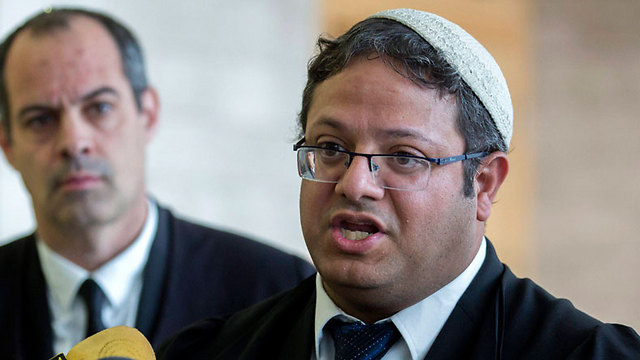
December 20, 2015, was a cold night in the village of Duma. The sky was clear of clouds, but the cold, around 5 degrees Celsius, was bone-chilling. Around 2am, the quiet night was interrupted by the roar of engines - a convoy of Shin Bet, police and IDF vehicles was making its way into the village, and the dogs awoke and started barking. The residents woke up in a fright and peeked outside to see who was raiding Duma in the dead of night.
One of the residents pulled out his cellphone and filmed Amiram Ben-Uliel leaving one of those vehicles. The young man was taking in the cold night air. Twenty days have passed since he was arrested, and he spent most of his time in stifling interrogation rooms, under constant pressure in an effort to make him talk, and get a confession out of him of the heinous murder of the Dawabsheh family.
Ben-Uliel managed to go 17 days without saying a word, until he was branded a "ticking bomb" by the Shin Bet interrogators, who received special permission from attorney-general Yehuda Weinsten to use "special interrogation methods" on him, the formal codename for torture.
After three days of intensive interrogation, during which he claims to have suffered serious violence at the hands of the Shin Bet interrogators, Ben-Uliel has confessed to throwing a Molotov cocktail into the home of the Dawabsheh family on the night of July 31, 2015, which caused the death of baby Ali and his parents, Saad and Reham, and wounded his brother, four-year-old Ahmad.
This confession, which he later recanted, led him and the interrogators to Duma that night, to recount the murder outside the burned-down Dawabsheh residence.
The reconstruction of the murder began in the car. The three interrogators and Ben-Uliel were looking around, trying to see if the area was safe for them to go outside. Ben-Uliel was hesitant. Several minutes earlier, when one of the interrogators was repeating the details out loud as part of the reconstruction, he gave short answers.
The interrogator wanted to hear from Ben-Uliel about the reconstruction, but he stuck to his evasive answers.
Interrogator: "Where are we going, Amiram?"
Ben-Uliel: "Ah... I don't know. Where are we going? I don't have a clue where we're going."
Interrogator: "What we talked about, Amiram. Nothing has changed."
Ben-Uliel: "I don't know... in Duma."
Interrogator: "To the village of Duma?"
(Silence)
Interrogator: "What are you going to show us in the village of Duma?"
Ben-Uliel: "Ah... houses."
Interrogator: "Houses?"
Ben-Uliel: "Yes."
Interrogator: "And what happened to these houses?"
Ben-Uliel: "They were set on fire."
The interrogator was content with these answers, explained the conditions of the reconstruction to Ben-Uliel and asked him to sign a declaration that said he was doing the reconstruction of his own free will. "Don't make me," Ben-Uliel urged him.
As they sat in the car, the interrogator says into the recorder: "The time is ten minutes to two, we entered the village." He then asks Ben-Uliel, "Look, tell me where you start identifying the area, okay?" The defendant's answers cannot be heard, and after a short silence he asks his interrogators, "Can we walk?" His interrogators ask him whether he can better identify the place on foot, and he responds "Uh... maybe. It'd be easier than seeing from inside the car."
The interrogators are conflicted. There's a large military force securing the area, but most of the conversation with Ben-Uliel is done inside the car, in order to not draw attention. They end up deciding to go outside anyway.
The confession Ben-Uliel gave and the reconstruction at the scene of the murder eventually led to the indictment against him in early January. He was charged with the murder of three members of the Dawabsheh family and the attempted murder of Ahmad Dawabsheh, charges that he now denies.
The evidence against him includes thousands of documents and protocols of interrogations conducted at the police's Nationalistically-Motivated Crime Unit at the Judea and Samaria District, as well as memos on Shin Bet interrogations.
He was interrogated around the clock - day and night. The interrogators worked in shifts, came and went, and he alone remained in the room, at times handcuffed to his chair, exhausted from the series of questions and the intensive efforts to make him talk. There were days he slept for only an hour or two, and days in which he was allowed to sleep for four hours.
Only a fraction of investigative materials
The lawyers representing Ben-Uliel and the other defendants have received 4,500 documents from the investigation so far.Along with the documents, they received some 100 discs with security camera photos from the night of the arson. The large investigation team covered a massive area, from the Hizma checkpoint in northeastern Jerusalem to the Gitit Checkpoint in the Jordan Valley, and through the Tapuach Junction in the Samaria region of the West Bank. They went through every camera - IDF cameras, settlements' cameras, cameras of Palestinian villages, and private security cameras of homes in Duma.
The lawyers in the case, including Itamar Ben-Gvir, claim that the material they received so far was only a small portion of the evidence they still need to receive. They say they received no documentation yet about the days of the interrogation in which Ben-Uliel claimed to have been tortured, torture they say led to his confession.
If such documentation exists, it's doubtful they'll receive it. So the story of the murder suspect's investigation remains incomplete.
"An initial inspection of the investigation's material reveals a grave picture of an aggressive interrogation," claimed Attorney Adi Keidar, who represents some of the defendants. "We believe the full picture will be revealed later on."
Ben-Gvir also denied that Ben-Uliel was guilty. "Those who read the protocols will discover that he (Ben-Uliel) is doing this reconstruction not out of his free will, and doesn't know the area."
The reconstruction that was obtained by Yedioth Ahronoth is only partial. It's missing the part in which Ben-Uliel is filmed and documented recounting the crime and providing, according to investigators, hidden details about the scene of the crime and the arson itself that only the person who committed the crime could know - among them the shards of glass from the green bottle used as a Motolov cocktail, or the fact he tripped while fleeing the village - which was spotted by one of the neighbors.
The rebellious hilltop youth Ben-Uliel may have started the reconstruction with hesitation, but continued it with his head held high. He did not seem afraid at the Palestinian village. Moments before leading the investigators into the yard of the Dawabsheh home, one of the interrogators told him to put on a hat, and tuck in his unruly peyot. Curious residents are already looking through the windows and the interrogators are concerned the sight of the settler recounting the murder can spark a riot.
"I don't want you to stand out here," the interrogator tells Ben-Uliel.
"I want to stand out," he responds decisively.
"You want to stand out? In what way?" the interrogator asks.
"Just kidding, I don't know..." Ben-Uliel responds, amused. "What, am I ashamed of something?"



















